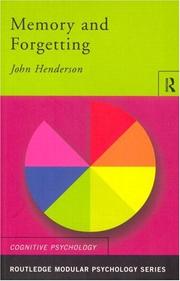| Listing 1 - 10 of 635 | << page >> |
Sort by
|
Book
ISBN: 039027805X Year: 1972 Publisher: New York (N.Y.): Appleton-Century-Crofts
Abstract | Keywords | Export | Availability | Bookmark
 Loading...
Loading...Choose an application
- Reference Manager
- EndNote
- RefWorks (Direct export to RefWorks)
Memory --- Retention (Psychology) --- Intellect --- Psychology --- Thought and thinking --- Comprehension --- Executive functions (Neuropsychology) --- Mnemonics --- Perseveration (Psychology) --- Reproduction (Psychology) --- Memory.

ISBN: 0340691956 Year: 1997 Publisher: London Arnold
Abstract | Keywords | Export | Availability | Bookmark
 Loading...
Loading...Choose an application
- Reference Manager
- EndNote
- RefWorks (Direct export to RefWorks)
#psyc:gift 1998 --- Memory --- Retention (Psychology) --- Intellect --- Psychology --- Thought and thinking --- Comprehension --- Executive functions (Neuropsychology) --- Mnemonics --- Perseveration (Psychology) --- Reproduction (Psychology)

ISBN: 0415186528 Year: 1999 Publisher: London Routledge
Abstract | Keywords | Export | Availability | Bookmark
 Loading...
Loading...Choose an application
- Reference Manager
- EndNote
- RefWorks (Direct export to RefWorks)
#PBIB:2004.4 --- Memory --- Retention (Psychology) --- Intellect --- Psychology --- Thought and thinking --- Comprehension --- Executive functions (Neuropsychology) --- Mnemonics --- Perseveration (Psychology) --- Reproduction (Psychology)
Book
ISBN: 0333101596 Year: 1971 Publisher: London Macmillan
Abstract | Keywords | Export | Availability | Bookmark
 Loading...
Loading...Choose an application
- Reference Manager
- EndNote
- RefWorks (Direct export to RefWorks)
Memory --- Retention (Psychology) --- Intellect --- Psychology --- Thought and thinking --- Comprehension --- Executive functions (Neuropsychology) --- Mnemonics --- Perseveration (Psychology) --- Reproduction (Psychology)

ISBN: 0674582055 Year: 1998 Publisher: Cambridge (Mass.): Harvard university press
Abstract | Keywords | Export | Availability | Bookmark
 Loading...
Loading...Choose an application
- Reference Manager
- EndNote
- RefWorks (Direct export to RefWorks)
Memory --- Retention (Psychology) --- Intellect --- Psychology --- Thought and thinking --- Comprehension --- Executive functions (Neuropsychology) --- Mnemonics --- Perseveration (Psychology) --- Reproduction (Psychology) --- Memory.
Book
ISBN: 0470262907 Year: 1978 Publisher: Hillsdale Erlbaum
Abstract | Keywords | Export | Availability | Bookmark
 Loading...
Loading...Choose an application
- Reference Manager
- EndNote
- RefWorks (Direct export to RefWorks)
Memory --- #Lilly --- Retention (Psychology) --- Intellect --- Psychology --- Thought and thinking --- Comprehension --- Executive functions (Neuropsychology) --- Mnemonics --- Perseveration (Psychology) --- Reproduction (Psychology) --- Memory. --- Psychophysiology.
Book
ISBN: 9781841694221 9781138882928 9780203848760 9781136950643 9781136950599 9781136950636 1138882925 1841694223 Year: 2009 Publisher: New York : Psychology Press,
Abstract | Keywords | Export | Availability | Bookmark
 Loading...
Loading...Choose an application
- Reference Manager
- EndNote
- RefWorks (Direct export to RefWorks)
In over 100 years of scientific research on human memory, and nearly 50 years after the so-called cognitive revolution, we have nothing that really constitutes a widely accepted and frequently cited law of memory, and perhaps only one generally accepted principle. The purpose of this monograph is to begin to rectify this situation by proposing 7 principles of human memory that apply to all memory. These principles are qualitative statements of empirical regularities that can serve as intermediary explanations and which follow from viewing memory as a function. They apply to all types of information, to all memory systems, and to all time scales. The principles highlight important gaps in our knowledge, challenge existing organizational views of memory, and suggest important new lines of research.This volume is intended for people in the field of memory (from advanced undergraduates to seasoned researchers), although it will be of interest to those who would like a comprehensive overview of the fundamental regularities in cognitive functioning.
Memory --- Memory. --- Mémoire --- Retention (Psychology) --- Intellect --- Psychology --- Thought and thinking --- Comprehension --- Executive functions (Neuropsychology) --- Mnemonics --- Perseveration (Psychology) --- Reproduction (Psychology)

ISBN: 0416819702 041681980X Year: 1975 Volume: A6 Publisher: London Methuen
Abstract | Keywords | Export | Availability | Bookmark
 Loading...
Loading...Choose an application
- Reference Manager
- EndNote
- RefWorks (Direct export to RefWorks)
Memory --- Mémoire --- Retention (Psychology) --- Intellect --- Psychology --- Thought and thinking --- Comprehension --- Executive functions (Neuropsychology) --- Mnemonics --- Perseveration (Psychology) --- Reproduction (Psychology)
Book
ISBN: 1775276619 1775276600 Year: 2018 Publisher: British Columbia : Peter Wall Institute for Advanced Studies,
Abstract | Keywords | Export | Availability | Bookmark
 Loading...
Loading...Choose an application
- Reference Manager
- EndNote
- RefWorks (Direct export to RefWorks)
"This book examines the character and relevance of remembrance, inviting readers to think creatively and deeply about the ways that memories are transmitted, recorded, and distorted through time and space. Ranging from molecular genetics and astrophysics to law and Indigenous oral histories, the essays draw from a diverse group of contributors to capture different perspectives on memory. Reflecting upon memory in engaging and unexpected ways, this collection offers an interdisciplinary roadmap for exploring how, why, and when we remember."--
Memory. --- Retention (Psychology) --- Intellect --- Psychology --- Thought and thinking --- Comprehension --- Executive functions (Neuropsychology) --- Mnemonics --- Perseveration (Psychology) --- Reproduction (Psychology)

ISBN: 1281070696 9786611070694 0080554040 0123736072 9780080554044 9780123736079 Year: 2008 Publisher: London : Academic Press,
Abstract | Keywords | Export | Availability | Bookmark
 Loading...
Loading...Choose an application
- Reference Manager
- EndNote
- RefWorks (Direct export to RefWorks)
The view of memory use as skilled performance embraces the interactive nature of memory and higher order cognition. In considering the contexts in which memory is used, this book helps to answer such questions as:If asked where I live, how do I decide on a street address or city name?What influences my selection in a criminal lineup besides actual memory of the perpetrator?Why do expert golfers better remember courses they've played than amateur golfers?Chapters in this volume discuss strategies people use in responding to memory queries- whether and how to access m
Memory. --- Retention (Psychology) --- Intellect --- Psychology --- Thought and thinking --- Comprehension --- Executive functions (Neuropsychology) --- Mnemonics --- Perseveration (Psychology) --- Reproduction (Psychology)
| Listing 1 - 10 of 635 | << page >> |
Sort by
|

 Search
Search Feedback
Feedback About UniCat
About UniCat  Help
Help News
News